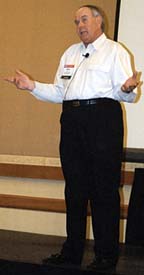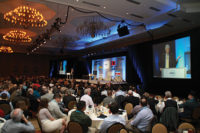
Hirni started the seminar by defining networking: It's the process of meeting a number of people for the purposes of exchanging career ideas. "It's really nothing more than having a bunch of little visits along the road of life," he said
Hirni offered seven suggestions for successful networking:
1. Think of yourself as a product, an information resource to others. "Everyone is unique and everyone is a walking encyclopedia, which is useful to others. You must realize you have value and can help others," said Hirni. No one can be good at everything, so a person's weaknesses can be offset by linking with someone else who has strengths in those areas.
2. Realize that your most important asset is your attitude. "If you help enough people get what they want out of life, you will get what you want out of life," said Hirni. Sure, there are people out there who do nothing but take advantage; you need to accept it and move on. For everyone else, be nurturing and willing to share resources.
3. Have the courage and desire to establish new connections. This is one of the biggest inhibitors, said Hirni, because many people can't walk up to a total stranger and just start talking. Hirni said that in a conference situation, it's easy enough to walk up to someone and say, "What do you hope to bring away from this conference?" He recommended a steady diet of practicing small talk and meeting new people. "Masterful networkers know how to kick off a conversation and build rapport," he said.
4. Be useful to others as you seek information. Have an attitude of gratitude. Appreciate help that is given to you. From the very first time you meet someone, think about how you can help them.
5. Discipline yourself to think proactively about what information you want or need. Think ahead and identify your top priorities, he advised, and then figure out whom you should contact. He offered several recommendations to get over this hurdle, especially at a convention. Before sitting down to a meal with fellow attendees, introduce yourself to everyone at the table. This sends the message that you would like to start a conversation.
6. Follow up on commitments you make. People remember what you have promised.
7. Say thank you frequently. This can be done through e-mail or by personal letter.
Hirni recommended that everyone equip themselves with a 10-second commercial that includes your name, company name, and a benefit of your business. As Hirni noted, you're looking for a memory lock, so the benefit needs to be unique. For example, he cited a trash-hauling company on the East Coast that has the motto, "Our business is picking up."
Hirni concluded by noting that this meeting would soon be over. "I sincerely hope at that point you will look back and have no regrets over the connections you made," he said.
Brad Hirni is a member of the International Federation for Professional Speakers. Contact him at 816-741-1943; echomktg@planetkc.com.
Publication date: 05/17/2004



